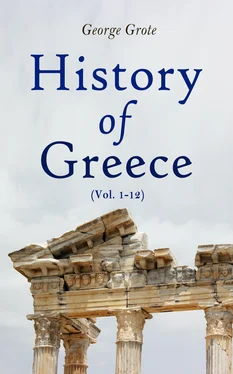George Grote - History of Greece (Vol. 1-12)
Здесь есть возможность читать онлайн «George Grote - History of Greece (Vol. 1-12)» — ознакомительный отрывок электронной книги совершенно бесплатно, а после прочтения отрывка купить полную версию. В некоторых случаях можно слушать аудио, скачать через торрент в формате fb2 и присутствует краткое содержание. Жанр: unrecognised, на английском языке. Описание произведения, (предисловие) а так же отзывы посетителей доступны на портале библиотеки ЛибКат.
- Название:History of Greece (Vol. 1-12)
- Автор:
- Жанр:
- Год:неизвестен
- ISBN:нет данных
- Рейтинг книги:5 / 5. Голосов: 1
-
Избранное:Добавить в избранное
- Отзывы:
-
Ваша оценка:
- 100
- 1
- 2
- 3
- 4
- 5
History of Greece (Vol. 1-12): краткое содержание, описание и аннотация
Предлагаем к чтению аннотацию, описание, краткое содержание или предисловие (зависит от того, что написал сам автор книги «History of Greece (Vol. 1-12)»). Если вы не нашли необходимую информацию о книге — напишите в комментариях, мы постараемся отыскать её.
History of Greece (Vol. 1-12) — читать онлайн ознакомительный отрывок
Ниже представлен текст книги, разбитый по страницам. Система сохранения места последней прочитанной страницы, позволяет с удобством читать онлайн бесплатно книгу «History of Greece (Vol. 1-12)», без необходимости каждый раз заново искать на чём Вы остановились. Поставьте закладку, и сможете в любой момент перейти на страницу, на которой закончили чтение.
Интервал:
Закладка:
Kronos and Rhea gave birth to Zeus and his brothers and sisters. The concealment and escape of the infant Zeus, and the swallowing of the stone by Kronos, are given in the Orphic Theogony substantially in the same manner as by Hesiod, only in a style less simple and more mysticized. Zeus is concealed in the cave of Nyx, the seat of Phanês himself, along with Eidê and Adrasteia, who nurse and preserve him, while the armed dance and sonorous instruments of the Kurêtes prevent his infant cries from reaching the ears of Kronos. When grown up, he lays a snare for his father, intoxicates him with honey, and having surprised him in the depth of sleep, enchains and castrates him. 39Thus exalted to the supreme mastery, he swallowed and absorbed into himself Mêtis, or Phanês, with all the preëxisting elements of things, and then generated all things anew out of his own being and conformably to his own divine ideas. 40So scanty are the remains of this system, that we find it difficult to trace individually the gods and goddesses sprung from Zeus beyond Apollo, Dionysos, and Persephonê,—the latter being confounded with Artemis and Hekatê.
But there is one new personage, begotten by Zeus, who stands preëminently marked in the Orphic Theogony, and whose adventures constitute one of its peculiar features. Zagreus, “the horned child,” is the son of Zeus by his own daughter Persephonê: he is the favorite of his father, a child of magnificent promise, and predestined, if he grow up, to succeed to supreme dominion as well as to the handling of the thunderbolt. He is seated, whilst an infant, on the throne beside Zeus, guarded by Apollo and the Kurêtes. But the jealous Hêrê intercepts his career and incites the Titans against him, who, having first smeared their faces with plaster, approach him on the throne, tempt his childish fancy with playthings, and kill him with a sword while he is contemplating his face in a mirror. They then cut up his body and boil it in a caldron, leaving only the heart, which is picked up by Athênê and carried to Zeus, who in his wrath strikes down the Titans with thunder into Tartarus; whilst Apollo is directed to collect the remains of Zagreus and bury them at the foot of Mount Parnassus. The heart is given to Semelê, and Zagreus is born again from her under the form of Dionysos. 41
Such is the tissue of violent fancies comprehended under the title of the Orphic Theogony, and read as such, it appears, by Plato, Isokratês and Aristotle. It will be seen that it is based upon the Hesiodic Theogony, but according to the general expansive tendency of Grecian legend, much new matter is added: Zeus has in Homer one predecessor, in Hesiod two, and in Orpheus four.
The Hesiodic Theogony, though later in date than the Iliad and Odyssey, was coeval with the earliest period of what may be called Grecian history, and certainly of an age earlier than 700 B. C. It appears to have been widely circulated in Greece, and being at once ancient and short, the general public consulted it as their principal source of information respecting divine antiquity. The Orphic Theogony belongs to a later date, and contains the Hesiodic ideas and persons, enlarged and mystically disguised: its vein of invention was less popular, adapted more to the contemplation of a sect specially prepared than to the taste of a casual audience, and it appears accordingly to have obtained currency chiefly among purely speculative men. 42Among the majority of these latter, however, it acquired greater veneration, and above all was supposed to be of greater antiquity, than the Hesiodic. The belief in its superior antiquity (disallowed by Herodotus, and seemingly also by Aristotle 43), as well as the respect for its contents, increased during the Alexandrine age and through the declining centuries of Paganism, reaching its maximum among the New-Platonists of the third and fourth century after Christ: both the Christian assailants, as well as the defenders, of paganism, treated it as the most ancient and venerable summary of the Grecian faith. Orpheus is celebrated by Pindar as the harper and companion of the Argonautic maritime heroes: Orpheus and Musæus, as well as Pamphôs and Olên, the great supposed authors of theogonic, mystical, oracular, and prophetic verses and hymns, were generally considered by literary Greeks as older than either Hesiod or Homer: 44and such was also the common opinion of modern scholars until a period comparatively recent. It has now been shown, on sufficient ground, that the compositions which passed under these names emanate for the most part from poets of the Alexandrine age, and subsequent to the Christian æra; and that even the earliest among them, which served as the stock on which the later additions were engrafted, belong to a period far more recent than Hesiod; probably to the century preceding Onomakritus (B. C. 610-510). It seems, however, certain, that both Orpheus and Musæus were names of established reputation at the time when Onomakritus flourished; and it is distinctly stated by Pausanias that the latter was himself the author of the most remarkable and characteristic mythe of the Orphic Theogony—the discerption of Zagreus by the Titans, and his resurrection as Dionysos. 45
The names of Orpheus and Musæus (as well as that of Pythagoras, 46looking at one side of his character) represent facts of importance in the history of the Grecian mind—the gradual influx of Thracian, Phrygian, and Egyptian, religious ceremonies and feelings, and the increasing diffusion of special mysteries, 47schemes for religious purification, and orgies (I venture to anglicize the Greek word, which contains in its original meaning no implication of the ideas of excess to which it was afterwards diverted) in honor of some particular god—distinct both from the public solemnities and from the gentile solemnities of primitive Greece,—celebrated apart from the citizens generally, and approachable only through a certain course of preparation and initiation—sometimes even forbidden to be talked of in the presence of the uninitiated, under the severest threats of divine judgment. Occasionally such voluntary combinations assumed the form of permanent brotherhoods, bound together by periodical solemnities as well as by vows of an ascetic character: thus the Orphic life (as it was called) or regulation of the Orphic brotherhood, among other injunctions partly arbitrary and partly abstinent, forbade animal food universally, and on certain occasions, the use of woollen clothing. 48The great religious and political fraternity of the Pythagoreans, which acted so powerfully on the condition of the Italian cities, was one of the many manifestations of this general tendency, which stands in striking contrast with the simple, open-hearted, and demonstrative worship of the Homeric Greeks.
Festivals at seed-time and harvest—at the vintage and at the opening of the new wine—were doubtless coeval with the earliest habits of the Greeks; the latter being a period of unusual joviality. Yet in the Homeric poems, Dionysos and Dêmêtêr, the patrons of the vineyard and the cornfield, are seldom mentioned, and decidedly occupy little place in the imagination of the poet as compared with the other gods: nor are they of any conspicuous importance even in the Hesiodic Theogony. But during the interval between Hesiod and Onomakritus, the revolution in the religious mind of Greece was such as to place both these deities in the front rank. According to the Orphic doctrine, Zagreus, son of Persephonê, is destined to be the successor of Zeus, and although the violence of the Titans intercepts this lot, yet even when he rises again from his discerption under the name of Dionysos, he is the colleague and coëqual of his divine father.
This remarkable change, occurring as it did during the sixth and a part of the seventh century before the Christian æra, may be traced to the influence of communication with Egypt (which only became fully open to the Greeks about B. C. 660), as well as with Thrace, Phrygia, and Lydia. From hence new religious ideas and feelings were introduced, which chiefly attached themselves to the characters of Dionysos and Dêmêtêr. The Greeks identified these two deities with the great Egyptian Osiris and Isis, so that what was borrowed from the Egyptian worship of the two latter naturally fell to their equivalents in the Grecian system. 49Moreover the worship of Dionysos (under what name cannot be certainly made out) was indigenous in Thrace, 50as that of the Great Mother was in Phyrgia, and in Lydia—together with those violent ecstasies and manifestations of temporary frenzy, and that clashing of noisy instruments, which we find afterwards characterizing it in Greece. The great masters of the pipe—as well as the dythyramb, 51and indeed the whole musical system appropriated to the worship of Dionysos, which contrasted so pointedly with the quiet solemnity of the Pæan addressed to Apollo—were all originally Phrygian.
Читать дальшеИнтервал:
Закладка:
Похожие книги на «History of Greece (Vol. 1-12)»
Представляем Вашему вниманию похожие книги на «History of Greece (Vol. 1-12)» списком для выбора. Мы отобрали схожую по названию и смыслу литературу в надежде предоставить читателям больше вариантов отыскать новые, интересные, ещё непрочитанные произведения.
Обсуждение, отзывы о книге «History of Greece (Vol. 1-12)» и просто собственные мнения читателей. Оставьте ваши комментарии, напишите, что Вы думаете о произведении, его смысле или главных героях. Укажите что конкретно понравилось, а что нет, и почему Вы так считаете.












